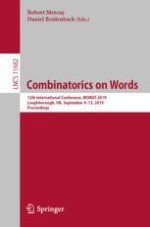2019 | OriginalPaper | Buchkapitel
On Sets of Words of Rank Two
verfasst von : Giuseppa Castiglione, Gabriele Fici, Antonio Restivo
Erschienen in: Combinatorics on Words
Aktivieren Sie unsere intelligente Suche, um passende Fachinhalte oder Patente zu finden.
Wählen Sie Textabschnitte aus um mit Künstlicher Intelligenz passenden Patente zu finden. powered by
Markieren Sie Textabschnitte, um KI-gestützt weitere passende Inhalte zu finden. powered by
